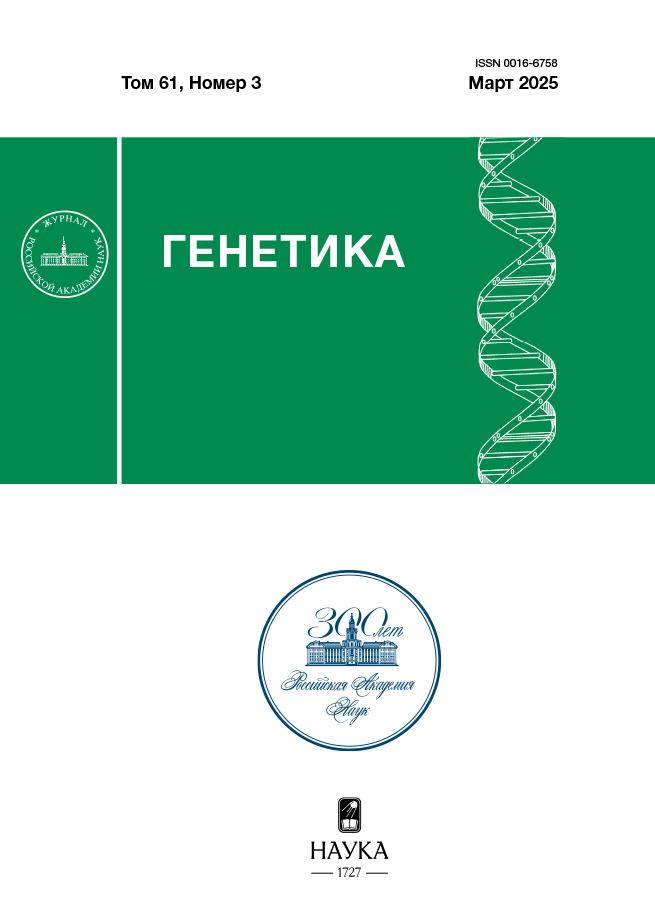Исследование эффекта взаимодействия черепно-мозговой травмы и функциональных полиморфизмов генов интерлейкинов на тяжесть течения шизофрении
- Авторы: Лежейко Т.В.1, Габаева М.В.1, Королева С.С.1, Колесина Н.Ю.1, Голимбет В.Е.1
-
Учреждения:
- Научный центр психического здоровья
- Выпуск: Том 61, № 3 (2025)
- Страницы: 78-84
- Раздел: КРАТКИЕ СООБЩЕНИЯ
- URL: https://rjmseer.com/0016-6758/article/view/679423
- DOI: https://doi.org/10.31857/S0016675825030084
- EDN: https://elibrary.ru/ULCXOB
- ID: 679423
Цитировать
Полный текст
Аннотация
Цель исследования – оценка ассоциаций между черепно-мозговыми травмами (ЧМТ) и выраженностью симптомов у больных шизофренией с учетом модулирующего влияния полиморфизмов генов про- и противовоспалительных интерлейкинов. В исследовании приняли участие 1157 больных шизофренией (рубрики F20, F21, F23.1, F25 по МКБ-10). У 452 пациентов в анамнезе отмечена ЧМТ, 538 пациентов наличие ЧМТ отрицали. Тяжесть симптомов шизофрении измеряли с помощью шкалы PANSS. Для генетического исследования выбраны три полиморфизма, находящиеся в промоторах генов, кодирующих интерлейкины IL-1β rs16944, IL4 rs2243250 и IL10 rs2243250. В результате обнаружен взаимный эффект ЧМТ и вариантов генов интерлейкинов IL-4 (C-589T) rs2243250 и IL-10 (C-592A) rs1800872 на выраженность симптомов шизофрении. В частности, в группе с ЧМТ у носителей генотипа СС полиморфизма IL-4 (C-589T) выраженность негативных и общепсихопатологических симптомов была выше, чем у носителей аллеля Т. Полиморфизм IL-10 (C-592A) rs1800872 модифицировал влияние ЧМТ только на общепсихопатологические симптомы шизофрении. Выраженность этих симптомов была выше у носителей генотипа СС по сравнению с носителями аллеля А. У больных без ЧМТ полиморфизмы не оказывали значимого эффекта на изучаемый фенотип. Таким образом, в нашем исследовании впервые показано, что наличие ЧМТ в анамнезе и генетические особенности пациента негативно влияют на тяжесть шизофрении.
Ключевые слова
Полный текст
Об авторах
Т. В. Лежейко
Научный центр психического здоровья
Автор, ответственный за переписку.
Email: lezheiko@list.ru
Россия, Москва, 115522
М. В. Габаева
Научный центр психического здоровья
Email: lezheiko@list.ru
Россия, Москва, 115522
С. С. Королева
Научный центр психического здоровья
Email: lezheiko@list.ru
Россия, Москва, 115522
Н. Ю. Колесина
Научный центр психического здоровья
Email: lezheiko@list.ru
Россия, Москва, 115522
В. Е. Голимбет
Научный центр психического здоровья
Email: lezheiko@list.ru
Россия, Москва, 115522
Список литературы
- Robinson N., Bergen S.E. Environmental risk factors for schizophrenia and bipolar disorder and their relationship to genetic risk: Current knowledge and future directions // Front. Genet. 2021. V. 12. https://doi.org/10.3389/fgene.2021.686666
- Kim E. Does traumatic brain injury predispose individuals to develop schizophrenia? // Curr. Op. in Psychiatry. 2008. V. 21(3). P. 286–289. https://doi.org/10.1097/YCO.0b013e3282fbcd21
- Nkemjika S., Olayinka O., Atolagbe A. et al. Traumatic brain Injury related schizophrenia in individuals without family history: A case series // J. Natl Med. Ass. 2022. V. 114(2). P. 207–210. https://doi.org/10.1016/j.jnma.2022.01
- Molloy C., Conroy R.M., Cotter D.R. et al. Is traumatic brain injury a risk factor for schizophrenia? A meta-analysis of case-controlled population-based studies // Schizophrenia Bull. 2011. V. 37(6). P. 1104–1110. https://doi.org/10.1093/schbul/sbr091
- Silvestro S., Raffaele I., Quartarone A. et al. Innovative insights into traumatic brain injuries: Biomarkers and new pharmacological targets // Int. J. Mol. Sci. 2024. V. 25(4). https://doi.org/10.3390/ijms25042372
- Mavroudis I., Ciobica A., Balmus I.M. et al. A Systematic review and meta-analysis of the inflammatory biomarkers in mild traumatic brain injury // Biomedicines. 2024. V. 12(2). https://doi.org/10.3390/biomedicines12020293
- Cash A., Theus M.H. Mechanisms of blood-brain barrier dysfunction in traumatic brain Injury // Int. J. Mol. Sci. 2020. V. 21(9). https://doi.org/10.3390/ijms21093344
- Клюшник Т.П., Смулевич А.Б., Зозуля С.А., Воронова Е.И. Нейробиология шизофрениии и клинико-психопатологические корреляты (к построению клинико-биологической модели) // Психиатрия. 2021. T. 19(1). C. 6–15. https://doi.org/ 10.30629/2618-6667-2021-19-1-6-15
- Клюшник Т.П., Зозуля С.А., Андросова Л.В., Сарманова З.В. и др. Иммунологический мониторинг эндогенных приступообразных психозов // Журн. неврол. и психиатрии им. С.С. Корсакова. 2014. T. 114(2). C. 37–41. https://doi.org/10.31550/1727-2378-2023-22-6-7-14
- Dahan S., Bragazzi N.L., Yogev A. et al. The relationship between serum cytokine levels and degree of psychosis in patients with schizophrenia // Psychiatry Res. 2018. V. 268. P. 467–472. https://doi.org/10.1016/j.psychres.2018.07.041
- Yan F., Meng X., Cheng X. et al. Potential role between inflammatory cytokines and Tie-2 receptor levels and clinical symptoms in patients with first-episode schizophrenia // BMC Psychiatry. 2023. V. 25 (1). P. 538. https://doi.org/10.1186/s12888-023-04913-7
- Zhilyaeva T.V., Rukavishnikov G.V., Manakova E.A. et al. Serum interleukin-6 in schizophrenia: Associations with clinical and sociodemographic characteristics // Consort. Psychiatria. 2023. V. 22(4). P. 5–16. https://doi.org/10.17816/CP11067
- Ельчанинова Е.Ю., Афанасьева А.И., Смагина И.В., Ельчанинова С.А. Черепно-мозговая травма до дебюта рассеянного склероза: связь с прогрессированием неврологических расстройств и патобиохимическими показателями цереброспинальной жидкости // Журн. неврол. и психиатрии им. С.С. Корсакова. 2023. T. 123(7–2). C. 72–76. https://doi.org/10.17116/jnevro202312307272
- Rosenwasser L.J., Borish L. Genetics of atopy and asthma: The rationale behind promoter-based candidate gene studies (IL-4 and IL-10) // Am. J. Respiratory and Critical Care Med. 1997. V. 156(4–2). P. 152–155. https://doi.org/10.1164/ajrccm.156.4.12tac-14
- Pu H., Zheng X., Jiang X. et al. Interleukin-4 improves white matter integrity and functional recovery after murine traumatic brain injury via oligodendroglial PPARγ // J. Cerebral Blood Flow & Metabolism. 2021. V. 41(3). P. 511–529. https://doi.org/10.1177/0271678X20941393
- Dunleavy C., Elsworthy R.J., Upthegrove R. et al. Inflammation in first-episode psychosis: The contribution of inflammatory biomarkers to the emergence of negative symptoms, a systematic review and meta-analysis // Acta Psychiatrica Scandinavica. 2022. V. 146(1). P. 6–20. https://doi.org/10.1111/acps.13416
- Zhang Y.M., Zhou X.C., Xu Z. et al. Meta-analysis of epidemiological studies of association of two polymorphisms in the interleukin-10 gene promoter and colorectal cancer risk // Genet. Mol. Res. 2012. V. 11(3). P. 3389–3397. https://doi.org/10.4238/2012
- Crawley E., Kay R., Sillibourne J. et al. Polymorphic haplotypes of the interleukin-10 5′ flanking region determine variable interleukin-10 transcription and are associated with particular phenotypes of juvenile rheumatoid arthritis // Arthritis & Rheumatology. 1999. V. 42(6). P. 1101–1108. https://doi.org/10.1002/1529-0131
- Carlini V., Noonan D.M., Abdalalem E. et al. The multifaceted nature of IL-10: Regulation, role in immunological homeostasis and its relevance to cancer, COVID-19 and post-COVID conditions // Front. Immunol. 2023. V. 14. https://doi.org/10.3389/fimmu.2023.1161067
- Uzan M., Tanriverdi T., Baykara O. et al. Association between interleukin-1 beta (IL-1beta) gene polymorphism and outcome after head injury: An early report // Acta Neurochirurgica. 2005. V. 147(7). P. 715–720. https://doi.org/10.1007/s00701-005-0529
Дополнительные файлы











